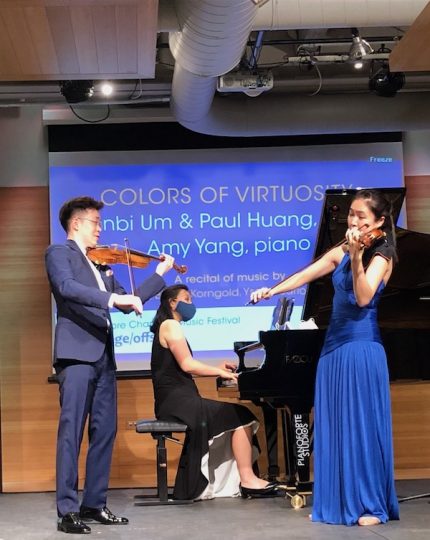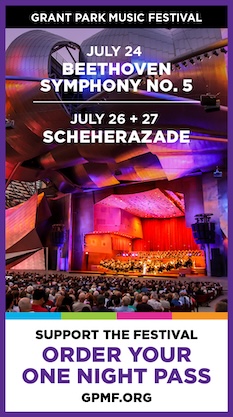North Shore Chamber Fest showcases gifted young duo, announces return of June series

Photo: Mark Hagland
Even as some local classical music groups maintain a deafening silence while others muster stopgap online performances of canned bits and pieces, the North Shore Chamber Music Festival keeps turning up the volume.
Indeed, its loyal public is being treated to a strong array of in-person and streaming musical events during lockdown, many of those events enlisting talented young artists worthy of such exposure.
The organization administered by the married team of pianist Angela Yoffe, executive director, and violinist and artistic director Vadim Gluzman, presented the latest event of its winter-spring “onstage/offstage” season Saturday night at PianoForte Chicago in downtown Chicago. The concert was livestreamed on the festival website and the Violin Channel (theviolinchannel.com).
An attractive program of virtuoso rarities for violin and piano, two violins and piano, and violin duo was performed by the gifted violinists Danbi Um (NSCMF’s first “young artist,” who went on to become a festival regular) and Paul Huang (winner of both the Avery Fisher Grant and Lincoln Center Award); they were sensitively yet incisively accompanied by pianist Amy Yang.
The PianoForte recital hall made an intimate, aurally and visually pleasing venue for this “concert with conversation,” and Covid-era safety protocols were observed. The performers wore masks and attendance was limited to 25 safely distanced listeners. The acoustic has a bright if dryish immediacy that allowed instrumental timbres and textures to project with considerable impact, if not always great subtlety.
Um and Huang have been playing together for seven years, from their first meeting at the Chamber Music Society of Lincoln Center. All three of Saturday’s artists are making names for themselves on the world stage, and their accomplished music-making on this occasion helped to explain why.
Their fiddle potpourri of Mendelssohn, Bloch, Korngold, Ysaÿe and others covered a number of interesting repertorial bases, interspersed with helpful spoken introduction from the artists.
Adding cachet to the occasion were the instruments themselves. Um secured a throbbing tone from a 1683 Nicolo Amati violin. Huang plumbed the viola-like richness of a 1742 Guarneri del Gesu (the so-called “ex-Wieniawski”) on loan from Chicago’s Stradivari Society. Yang performed on a hand-crafted Fazioli piano belonging to Pianoforte Chicago, whose malleable sound made a natural fit with the timbres produced by her colleagues.
For reasons that remain unexplained, Felix Mendelssohn never finished his F-Major Violin Sonata of 1838; it fell to Yehudi Menuhin to reconstruct the three movements from the autograph manuscript. Why the current generation of fiddle virtuosos hasn’t taken up this fine piece is a mystery. The sonata consists of a lyrical slow movement surrounded by an ebullient Allegro vivace and a mercurial perpetuum mobile finale. The fervent shaping of the Adagio’s long singing line by Huang and Yang revealed the music’s poetic kinship to Mendelssohn’s solo-piano Songs without Words.
Menuhin was the common denominator of the Mendelssohn opus and Ernest Bloch’s Avodah (1929). Bloch dedicated his brief arrangement of a Hebrew prayer to Menuhin, who was all of seven at the time when they first met, roughly a decade away from global fame. Bloch was said to have been moved to tears by the young prodigy’s depth of expression and precocious musicality. The piece brought a heartfelt response from Um and Yang.
It’s a pity that about all that we usually hear of Erich Wolfgang Korngold’s huge and multifaceted oeuvre are fitful performances of his Violin Concerto, early operatic masterpiece Die Tote Stadt, and some of the film scores he composed in Hollywood following his emigration to the U.S. in 1934. The suite of four pieces for violin and piano he drew from his incidental music for Shakespeare’s play Much Ado About Nothing stands as one of his most charming early works. The Um-Yang duo went straight to the beating heart of its Viennese charm and sentiment. The sensuous “Garden Scene,” which Jascha Heifetz long popularized as a recital encore, was especially winning.
The seldom-heard Sonata in A minor for Two Violins is a kind of pendant to the set of six solo-violin sonatas on which Eugene Ysaÿe’s reputation chiefly rests. The Belgian violinist-composer often treats each fiddle part as an extension and mirror of the other, briefly allowing each to break into solo flight. This live reading by Huang and Um packed an even greater electric charge than the one posted by the duo on Facebook.
A contemporary piece, Amy Barlow’s Hebraique Elegie echoed Bloch’s use of Jewish musical modes in a rather more populist idiom; the rhythmic and melodic nods to folk dance are punctuated by flying pizzicatos. Saturday’s violin duo savored its mournful intensities with palpable understanding.
Um, Huang and Yang closed with a rousing rendition of Pablo de Sarasate’s Navarra, the title deriving from the region in Spain where the 19th century virtuoso was born. A great deal of bravura gimcracks are packed into this seven-minute showpiece—the violinistic equivalent of Olympic-level synchronized figure skating, as Huang aptly observed. Playing from memory, the duo dispatched its stratospheric leaps and spins with jaw-dropping panache. If their proximity to the audience made their fortes feel rather aggressive, the sheer brilliance of their playing, buoyed by Yang’s alert accompaniment, carried the day.
___________
In other NSCMF news, Gluzman and Yoffe are pressing ahead with plans for a belated 10th anniversary festival of live (and live-streamed) chamber music concerts, June 9-12 at its regular venue, Village Presbyterian Church in Northbrook.
The three concerts, announced Saturday, will recreate the programs (and participating artists) that were to have been performed last June but had to be postponed because of the lockdown. Complimentary admission will be offered to 75 concertgoers; others may attend, also for free, via live-streaming.
The festival also announced that its “onstage/offstage” winter-spring series will take place again in the 2021-22 season.
German violinist and pedagogue Friedemann Eichhorn presents a master class with recipients of NSCMF’s Arkady Fomin Scholarship Fund May 2. The event will be streamed on the festival website, nscmf.org, and on the Violin Channel (theviolinchannel.com).
Posted in Performances
